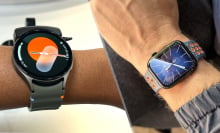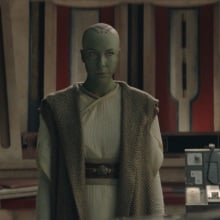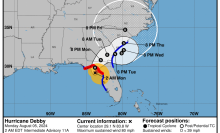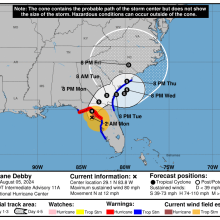Master Chief is a relic from a different era in video games, a time when seemingly all the heroes were gruff white men who spoke through their weapons more than their mouths. The Halo TV series on Paramount+ surprises in a number of ways, but the biggest shock of all are the steps the story takes to unmask our inscrutable space marine.
Rather than relegate Chief (Pablo Schreiber), aka John-117, to mythic status on the sidelines, Halo makes him a central player. The mask comes off, but it's more than that. In the first two episodes that Paramount provided for review, Halo dives right into the head of the Spartan super-soldier and hints at some of the trauma that made him what he is. Just as importantly, he's not the show's sole focus.
Our story starts on the colony planet of Madrigal, where the hardscrabble local population represents a segment of humanity that has openly rebelled against the United Nations Space Command (UNSC), which Spartans like Master Chief serve. It's here that we meet Kwan Ha Boo (Yerin Ha), only daughter of the local resistance leader and a person who is about to have a truly awful day when alien forces invade.
That invasion introduces viewers to the Covenant, a multi-species alliance of non-human conquerors who are bound together by religious zealotry in their war against Earth's heathens. They arrive in an unexpected shower of guts and blood — yes, Halo isn't shy about getting gory — when shining beams of death cut through Madrigal's woods and turn their first human victims into little more than red mist.
The tide only turns when Master Chief and his squad of fellow Spartans show up to save the day. It's here that Halo makes clear its attachment to the games, with Chief and his Spartan squad swapping fire with Covenant in a pitched ground battle that fans are sure to mark with squeals of delight as they clock pitch-perfect prop recreations, authentic sound effects, and stylistic flourishes (like a moment that plunges us into a Chief's-eye view of the action).

It's an exciting and action-fueled introduction to Halo's TV universe that tells us almost immediately: This is a violent show that pulls no punches, yes, but it's one that understands the source material it draws from. The intro also packs in a crucial amount of vital exposition and scene-setting, just for good measure.
By the time the guns stop firing, Halo has set a compelling scene. You'll understand why far-flung colonists aren't the UNSC's greatest fans, and you'll see the origins of whatever grand space adventure lies ahead for Kwan Ha. You'll also get your first glimpse of the deeper mystery at play when Chief discovers an ancient alien artifact that unlocks... something in his heavily programmed Spartan brain.
In perhaps the show's sharpest choice, there's very little in the opening scenes, or really across the first two episodes as a whole, that depends on knowledge of the games. The opening two hours pack in a tremendous amount of world-building, even visiting locations gamers have never seen before and introducing known characters with far more complexity and nuance than their digital counterparts.
The result is a premiere that feels like a genuinely new sci-fi TV series rather than a wholesale extension of something that already exists. Fans of the games will find plenty to like if they're scouring every frame for familiar sights. But all of it feels organic, fitting naturally into the TV universe viewers are introduced to.
By the time the guns stop firing, 'Halo: The Series' has set a compelling scene.
That said, Halo is clearly going to need more than two episodes to really find its footing. It still feels like we're in character and story setup mode after the second hour, especially with regard to people not named Kwan Ha or Master Chief. There's a cast of intriguing characters arrayed around those two, and all of them seemingly tie to subplots that will shape our journey through Halo's debut season.
There's Soren-006 (Bokeem Woodbine), a Spartan program dropout who has some personal history with Chief from the days before he put on his helmet. Woodbine doesn't have much going on yet, but he makes the most of his early scenes, building on Soren's complicated history with Chief and the UNSC in a way that helps us understand what makes both men tick.
We also get some glimpses of the other side, with scenes featuring a Covenant ruling council conferring with a mysterious human ally, Makee (Charlie Murphy). These moments make clear the magnitude of Chief's artifact discovery on Madrigal. He'll clash with them eventually, there's no doubt, and Makee — a character who never existed in the games — will have a central role to play. But by the end of episode 2, the Covenant's motives (beyond just not liking humans all that much) remain a mystery.
The most developed subplot up front involves UNSC palace intrigue. Dr. Catherine Halsey (Natascha McElhone), a scientist and the creator of the Spartan program, is at odds with Admiral Margaret Parangosky (Shabana Azmi), who runs the military's intelligence division. Dr. Halsey has a secretive Spartan upgrade almost ready to go, but Adm. Parangosky has her doubts.
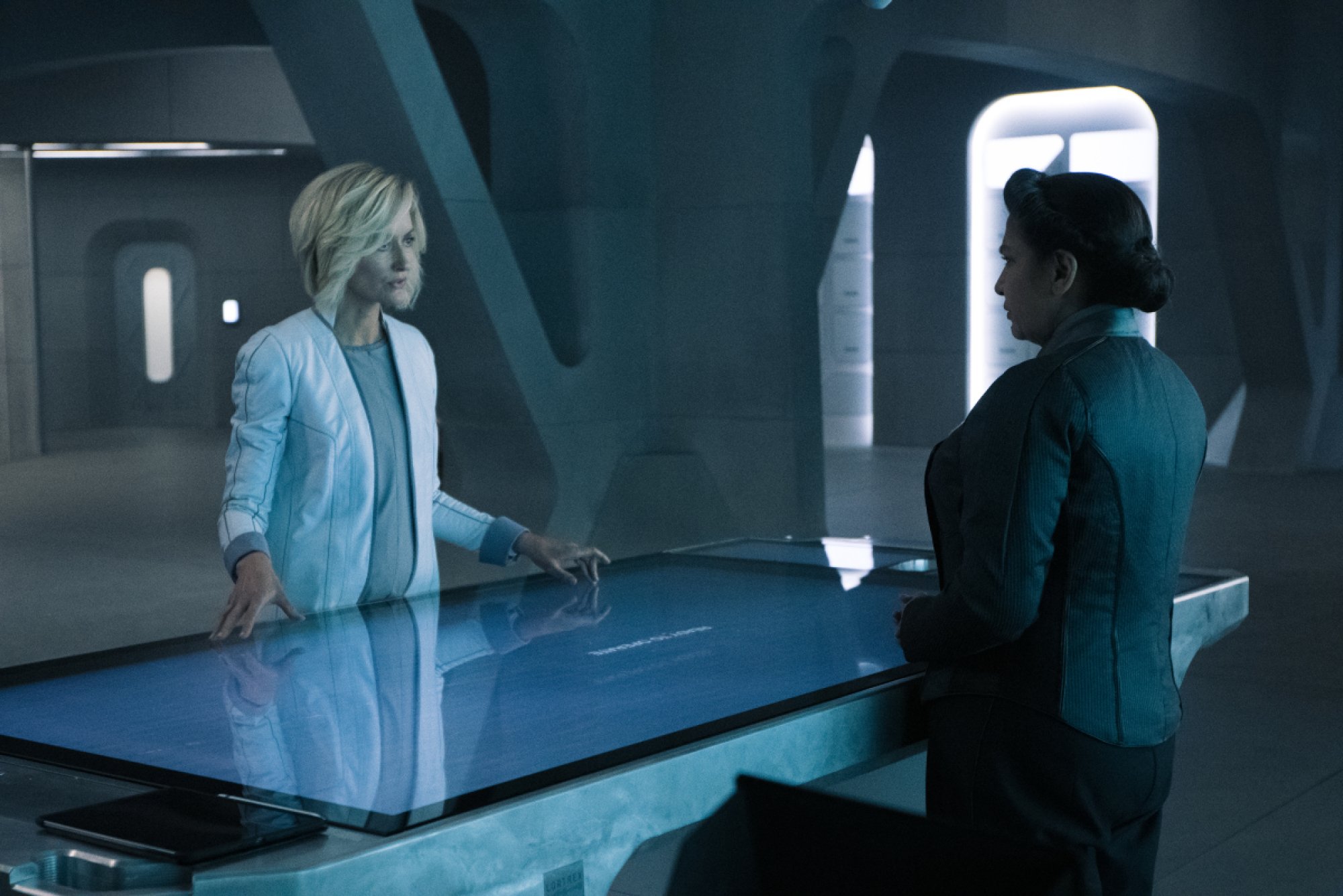
This subplot is seemingly how the show will introduce Cortana, Chief's AI companion from the games. The legendary Spartan, we quickly learn, is as much a victim of Halsey's conditioning program as he is a beneficiary. When his human side begins to resurface in a way that leaves him at odds with his commanders, Cortana is mentioned as a possible fix — a way to bring the absent Spartan back into the UNSC fold as an obedient and rule-following tool of destruction.
It's an unexpected but perfectly welcome twist to see Halo poking at the murky morality of the UNSC's Spartan program. Questions around control and free will have always simmered in the subtext of every game, but Halo sets out right from the start to tackle these themes head-on.
I'd even call the willingness on the part of creators Kyle Killen and Steven Kane, along with their writing team, to re-frame foundational ideas from the games — Master Chief is a hero fighting for the good guys in the UNSC! — Halo's greatest strength. I've played all the games, but I lost the script on their dense and convoluted lore long ago. Grounding this dense sci-fi universe in familiar ideas instantly makes the whole thing more approachable.
Weed and gaming are a perfect match, but are there hidden benefits?
14 of the best 'Wordle' clones, because one word a day isn't enough
Bungie brings some of that old Halo magic to Destiny in 'The Witch Queen'
A fresh start was always going to be essential for making a show like this work, of course. I'm thrilled with how Halo's stakeholders recognized and realized that need. They've actually done the work of peeling back layers on crucial characters and ideas, and raising the kinds of hard questions that a television show is uniquely equipped to address.
The first two hours of Halo do exactly what a brand new TV show should do: They introduce the world, the key characters, and the dominant themes. They give us some hooks to hang our interest on. They're revealing in all sorts of ways, but they leave plenty of questions dangling, too. It feels surreal to say this, and to feel it in my bones, but it's true: Halo is good TV.






